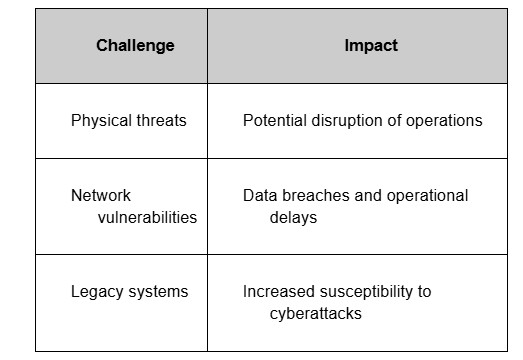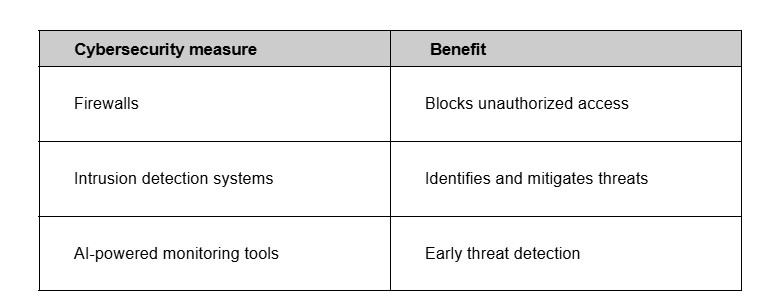Why Security is a Critical Factor in Telecom System Integration for Oil & Gas
Telecom system integration plays a pivotal role in the oil and gas industry, enabling seamless communication and efficient operations. However, the complex and high-stakes nature of this sector introduces unique security challenges. This article delves into the critical importance of security in telecom system integration for oil and gas, exploring key challenges, consequences, best practices, and future trends.
The Unique Security Challenges of Oil & Gas Telecom Systems
Oil and gas operations span remote locations, offshore platforms, and vast pipelines. This geographic dispersion introduces vulnerabilities such as:
- Physical Security Threats: Equipment and infrastructure are often in isolated areas, making them susceptible to tampering and theft.
- Network Vulnerabilities: Extensive networks are exposed to cyberattacks, including hacking, phishing, and ransomware.
- Legacy Systems: Many oil and gas companies rely on outdated systems that lack modern security measures.

The Consequences of a Security Breach in Oil & Gas Telecom
A security breach in telecom systems can have catastrophic consequences for oil and gas companies:
- Operational Downtime: Breaches can disrupt critical communication systems, halting operations.
- Financial Losses: Repairing systems, compensating for downtime, and mitigating breaches incur significant costs.
- Reputation Damage: Loss of customer trust and potential regulatory penalties can tarnish a company’s reputation.
- Environmental Impact: Breaches could lead to mishandling of operations, causing environmental hazards.
Graph: Financial Impact of Security Breaches in Oil & Gas Telecom Systems (Bar graph comparing financial losses due to breaches over five years.)
The Importance of Secure Data Transmission in Oil & Gas Operations
Secure data transmission ensures:
- Integrity of Operational Data: Prevents unauthorized alterations.
- Real-time Decision Making: Protects the accuracy and availability of data.
- Compliance with Regulations: Meets industry standards for data security.
The use of encryption, Virtual Private Networks (VPNs), and multi-factor authentication significantly enhances data transmission security.
The Role of Cybersecurity in Protecting Oil & Gas Telecom Systems
Cybersecurity measures are vital to:
- Prevent Intrusions: Firewalls and intrusion detection systems shield networks from attacks.
- Detect Threats Early: AI-powered monitoring tools identify vulnerabilities before exploitation.
- Ensure Business Continuity: Robust cybersecurity minimizes downtime during attacks.

Best Practices for Secure Telecom System Integration in Oil & Gas
- Conduct Regular Security Audits: Identify and rectify vulnerabilities.
- Adopt Modern Technologies: Replace legacy systems with advanced, secure solutions.
- Implement Employee Training: Ensure staff is equipped to handle security protocols.
- Collaborate with Experts: Work with telecom security specialists for robust solutions.
The Benefits of Implementing a Secure Telecom System in Oil & Gas
A secure telecom system offers:
- Enhanced Operational Efficiency: Reduces downtime and ensures smooth operations.
- Protection Against Financial Losses: Prevents breaches that could lead to monetary setbacks.
- Regulatory Compliance: Meets global and local security standards.
- Improved Stakeholder Confidence: Assures stakeholders of reliable and safe operations.
The Future of Secure Telecom System Integration in Oil & Gas
The future of secure telecom system integrator in oil and gas will be shaped by:
- Artificial Intelligence: AI will drive predictive threat analysis and faster responses.
- Blockchain Technology: Ensures secure and tamper-proof data transmission.
- Increased Automation: Enhances security by reducing human error.
Conclusion
Security is not just a component but a cornerstone of telecom system integration in the oil and gas sector. Addressing unique challenges, mitigating consequences, and adopting best practices ensure the resilience and reliability of these critical systems. As the industry continues to evolve, staying ahead of emerging threats will remain a top priority for ensuring uninterrupted and secure operations.
Aesthetix, a leading provider of telecom system integration services, specializes in delivering secure and innovative solutions tailored to the oil and gas industry. By leveraging their expertise, companies can build robust communication networks that safeguard critical operations and align with future security demands.
For more information or to discuss how Aesthetix can help secure your telecom systems, please contact us today.



